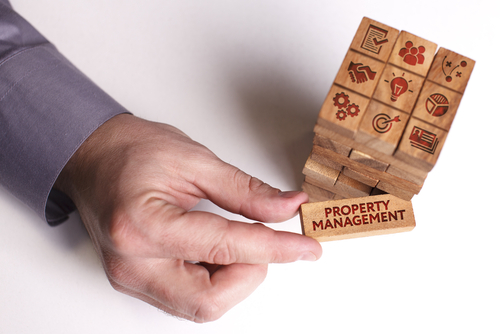November is National Career Development Month, so what better time to learn about rental property management? If you’ve been considering a rental management career, stick around while we review what makes a good property manager, how to become one, and average salaries for property managers across the US.

Contents of This Article:
- What is Rental Property Management?
- What Makes a Good Property Manager?
- Steps to Becoming a Property Manager
- Certifications and Education Requirements
- Average Salaries for Property Managers Across the US
- How to Find a Good Property Management Company
What is Rental Property Management?
Rental property management oversees and maintains residential, commercial, or industrial real estate properties. Property managers take care of the daily operations when a landlord or owner doesn’t have time to oversee the rental.
Property managers generally work for the owners of investment properties, ranging from single-family homes to shopping centers. That said, some of their primary responsibilities include the following:
- Screening All Prospective Tenants
- Communicate with Tenants and Property Owners
- Perform Property Inspections

- Collecting Rent Payments and Setting Rates
- Following Up with Late Payments
- Ensure All Properties are Compliant
- Conducting Tours and Showings
- Drafting, Signing, and Renewing Lease Agreements
- Coordinating Tenant Turnovers
- Hiring and Managing Contractors and Vendors
- Marketing Rental Properties
- Arranging for Repairs and Property Maintenance
- Rental Registration
- Accounting Duties and Reporting
- Monthly and Annual Financial Statements
- Excellent Customer Service
Additionally, property management companies must ensure compliance with all state and local landlord-tenant laws. Read along as we go over what makes a good property manager.
What Makes a Good Property Manager?
If you’re looking for a rental management career, you’ll need specific skills to help you excel at the job. After all, it’s not always easy to manage tenants and owners while overseeing several properties at once. In addition, you’ll likely encounter a problematic tenant or owner, which can be extremely overwhelming. So here are some of the top skills all property managers need.

- Good Communication
- Industry Knowledge
- Organizational Skills
- Patience and Professionalism
- Flexibility
Good Communication
Communication is vital in any industry–especially property management. As a property manager, you consistently communicate with applicants, tenants, owners, vendors, and other property managers. As such, strong verbal and written communication skills are a must. Most property managers send emails, reply to texts, talk on the phone, and issue written notices to tenants.
Need More Advice? contact us today!Industry Knowledge
Regardless of what industry you’re working in, it’s crucial to have some in-depth knowledge. That said, all but six US states require certain licensing and certifications to become a property manager. As such, you’ll want to know the ins and outs of the industry to manage rental properties successfully.
Organizational Skills
The organization is a crucial skill in the property management industry. After all, property managers in Philadelphia wear many hats and have several responsibilities. So, keeping track of the various tasks and processes takes impeccable organization. For instance, you’ll handle lease processes, turnovers, and accounting tasks requiring organization and multitasking.

Patience and Professionalism
As a property manager, you’ll work with prospective tenants, existing tenants, rental owners, vendors, and more. As such, remaining patient and professional throughout all interactions are critical. Whether you’re handling disputes or calming a rental owner’s nerves, patience and professionalism are essential.
Basic Accounting Skills
Property managers keep track of rent payments, late fees, expense reports, and more, which means basic accounting skills are necessary. Although there are several excellent software programs to assist with rental management and accounting, you’ll want to know some accounting best practices.
Steps to Becoming a Property Manager
The steps to becoming a property manager differ from state to state. Most states (all except six) have licensing requirements to become a property manager. Aside from that, there are a few minimum qualifications that all rental managers need, including:
- Minimum age of 18 or 21, depending on state requirements
- High school diploma or GED
- Legal US citizen or resident
- Real Estate License Coursework and Licensing Exam (depending on state law)
Most property management companies require further education and certifications past a high school diploma. So, if you’re considering the property management industry, we’ll review some of the necessary certificates and education requirements next.
Certifications and Education Requirements
Aside from your high school diploma, if you’re interested in a rental management career, you’ll want to look into undergraduate studies. For example, some areas of study include property management, business administration, finance, real estate, etc.
That said, there are also several certifications to consider if you’re looking into the property management field. So read along as we go over the steps to becoming a Master Property Manager.

- National Apartment Leasing Professional (NALP)
- Certified Apartment Manager (CAM)
- Certified Property Manager (CPM)
- Master Property Manager (MPM)
National Apartment Leasing Professional (NALP)
If you’re just starting in the rental management industry, you’ll likely be working in an entry-level position, like a leasing agent. That said, to get accreditation from the National Apartment Leasing Professional (NALP), you’ll need to complete these requirements:
- At least six months of onsite property management experience as a leasing agent.
- Obtain a provisional certificate until the six-month time requirement is met.
- Complete seven NALP courses for a total of 25 credit hours.
- Finish all requirements within 12 months of enrollment.
Certified Apartment Manager (CAM)
Once you’ve gotten certified by the NALP, the next step is property management. For this step, you’ll be onsite working and interacting with tenants daily. Certified Apartment Manager (CAM) training helps managers represent owners and investors best. Some of the requirements include the following:
- At least 12 months of onsite property experience in a management role.
- Obtain a provisional certificate until the 12-month requirement is met.
- Complete CAM courses, equalling 40 credit hours.
- Finish all requirements within 12 months of enrollment.
Certified Property Manager (CPM)
Property managers work extremely hard to get certified and are one step closer to becoming Master Property Managers. Similarly, the requirements for Certified Property Managers include:
- At least three years of consecutive employment in a real estate management role.
- Hold a real estate license or verify that they don’t need one.
- Meet a minimum of 19 out of 36 CPM Function Requirement activities as credit towards CPM certification.
- Finish all requirements within 12 months of enrollment.
Additionally, to become a CPM, you must manage the minimum portfolio of rental properties. The requirements are as follows:
- Residential- Meet or exceed 200 units on 1 to 4 sites or 100 units at five or more sites.
- Commercial- Meet or exceed 120,000 square feet at one site or 80,000 square feet at two or more sites.
- Industrial- meet or exceed 200,000 square feet at one or more locations.
Master Property Manager (MPM)
Finally, the last and highest level of property management is a Master Property Manager (MPM). If you want this type of rental management career, you need consecutive management experience for at least 60 months. Additionally, you must meet all of the CPM certification and portfolio requirements. For this level, you’ll need a minimum count of 500 residential units at one or more sites or 100 units at five or more sites.
Average Salaries for Property Managers Across the US

The average salary for property managers can range from $34,000 to around $70,000 per year. However, the average salary in the US is around $51,512 per year.
Ultimately, your salary depends on your experience, education, certifications, location, and volume of managed properties. Additionally, more industry and technology knowledge can lead to a higher pay grade. That said, here’s an overview of the average salaries of property managers in key US locations.
- Baltimore: $40,000 to $95,000
- Philadelphia: $48,000 to $92,000
- Northern Virginia: $47,000 to $90,000
- Washington DC: $45,000 to $96,000
How to Find a Good Property Management Company
Above all, a rental property management career is a great choice if you want to immerse yourself in the world of real estate. Additionally, you can scale up and create a great career as a Master Property Manager.
Contact Bay Property Management Group today!
If you’re a landlord looking for a good property management company, look no further than Bay Property Management Group. Our team of qualified professionals is eager and prepared to help your rental business succeed. So, whether you need help managing one property or 100, BMG can help!
We offer comprehensive rental management services, including maintenance, rent collection, tenant screening, and more. Contact BMG today if you need property management in Baltimore, Philadelphia, Northern Virginia, and Washington, DC.

